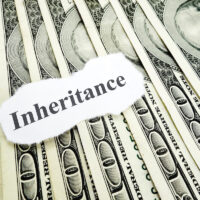Receiving an Inheritance During Bankruptcy

It might seem counterintuitive, but receiving an inheritance gift when you’re about to embark on or are in the midst of a bankruptcy filing can be more of a problem than a blessing. If the gift is large enough, it might allow you to avoid the bankruptcy process altogether, but there is also the likelihood that the gift could become part of your bankruptcy estate to be distributed among your creditors. There may be some strategies you or the possible benefactor can implement to protect this gift, as well as strategies that a smart attorney may use to ensure that the form of bankruptcy you file is the best way to promote your financial interests.
Inheriting After You File
Inheriting money will have a different effect depending on when the inheritance occurs and what form of bankruptcy you’ve filed. If you inherit a gift or are the beneficiary of a life insurance policy prior to filing bankruptcy, that money or property is automatically considered to be part of your estate. If you have filed for bankruptcy under Chapter 7, and become entitled to an inheritance gift within 180 days (about six months) of filing, that gift will become the property of the bankruptcy estate. This can be especially problematic where you inherit a share in a piece of real estate, and the trustee requires that you liquidate your interest in the property to satisfy creditors. However, if you become entitled to the gift more than six months after filing, it will not be considered part of your bankruptcy estate.
The 180-day rule does not protect inheritances for bankruptcies filed under Chapter 13. If you are a Chapter 13 petitioner, the gift can be considered disposable income which the bankruptcy trustee can account for in an adjusted repayment plan.
What You Can Do
If you do become entitled to or inherit a gift after you’ve filed for bankruptcy, be sure to let your attorney know as soon as possible. Your attorney may suggest that you change the legal status of your bankruptcy filing. If you’ve filed under Chapter 13 and receive a large gift, you may benefit more in the long run by dismissing your bankruptcy filing and paying off the debt with the inheritance. On the other end of the spectrum, if the gift is relatively small, it may not be worthwhile to the trustee to keep the bankruptcy open long enough to amend your plan to account for the income. If your attorney believes the gift could be protected if your bankruptcy were filed under Chapter 7, then your filing may be dismissed and refiled, depending on the circumstances of your case.
Of course, no one can predict with perfect accuracy when a family member or spouse may pass away, and thus it can be difficult to plan how a gift can best be passed along to someone in bankruptcy. However, if there is some reason for you to believe this may happen, you may want to discuss the possibility of the creation of a spendthrift trust, or possibly waive the inheritance, if that is an available option under applicable laws. A skilled New York bankruptcy attorney can walk you through this process.
If you are considering filing for bankruptcy in New York and need assistance from an experienced bankruptcy lawyer, contact the knowledgeable Hudson Valley bankruptcy attorneys at Rusk, Wadlin, Heppner & Martuscello for a consultation on your claims, at 845-331-4100 in Kingston or 845-236-4411 for our office in Marlboro.

